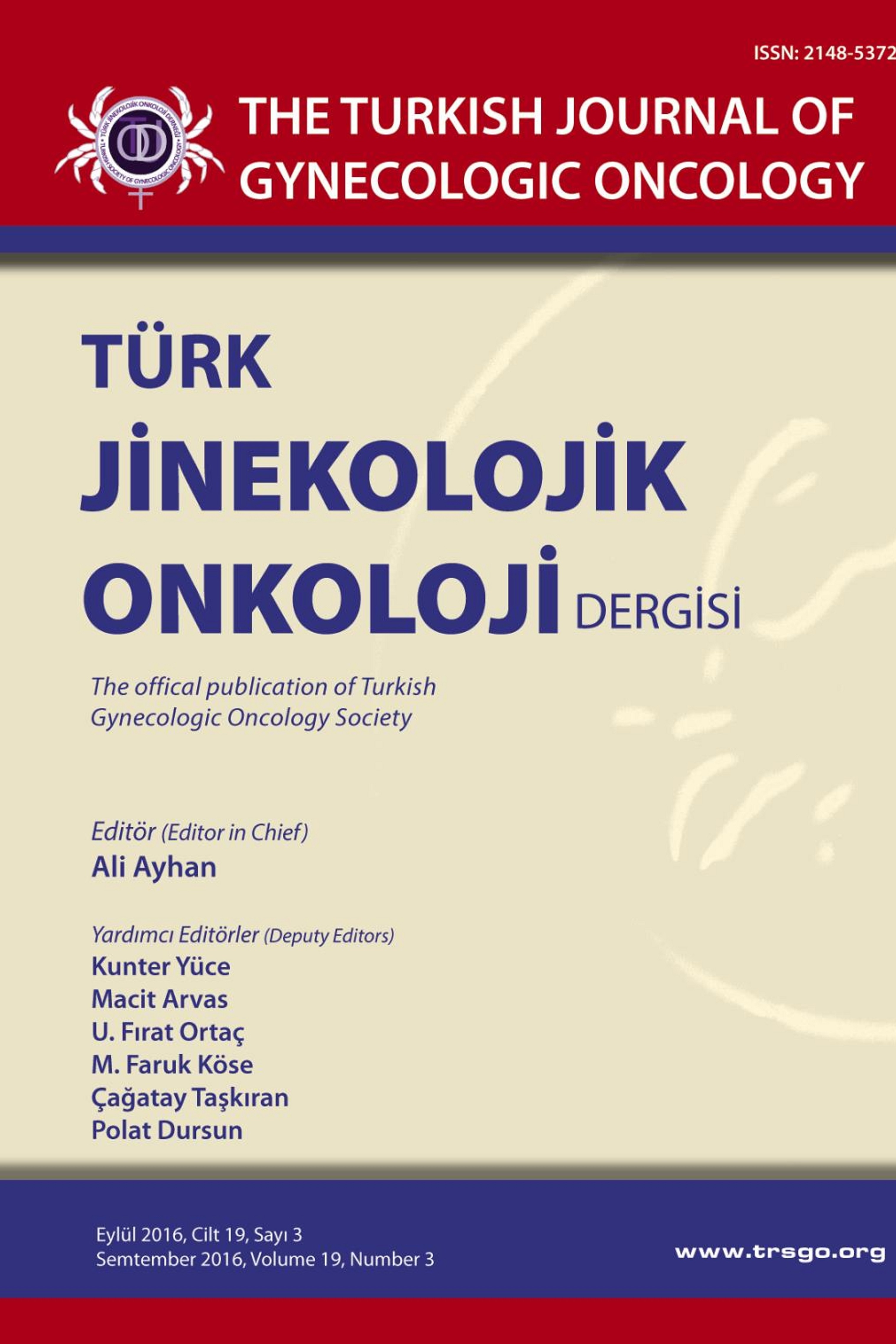KOLPOSKOPİ UYGULANAN OLGULARIN SOSYODEMOGRAFİK ÖZELLİKLERİNİN SERVİKAL BİYOPSİ SONUÇLARIYLA KORELASYONU
Amaç: Sunulan çalışma, servikal sitoloji anormalliği veya vulvar, vajinal ve servikal lezyon varlığı nedeniyle kolposkopi uygulanan olguların sosyodemografik özelliklerini ve sosyodemografik özelliklerinin kolposkopi sırasında alınan servikal biyopsi sonuçlarıyla korelasyonunu değerlendirmeyi amaçlamaktadır. Gereç ve Yöntem: Ocak 2011 ve Haziran 2012 tarihleri arasında, Antalya KETEM’nde, servikal sitoloji anormalliği veya vulvar, vajinal ve servikal lezyon varlığı nedeniyle kolposkopi uygulanan ve kolposkopi incelemesinin yeterli olarak kabul edildiği 301 kadın geriye dö- nük olarak değerlendirildi. Bulgular: Kolposkopi eşliğinde alınan servikal biyopsi sonucu normal olarak rapor edilen olgularla kıyaslandığında pre-invazif ve invazif servikal lezyon belirlenen olguların ortalama yaşı anlamlı olarak yüksekti (p=0.036). Bundan başka, pre-invazif ve invazif servikal hastalığı bulunan olgularda ortalama ilk koitus yaşı ve evli olma oranı anlamlı olarak daha düşüktü (sırasıyla p=0.001 ve p=0.002). Ayrıca, servikal patoloji saptanan olgularda düşük öğrenim düzeyi ve sigara alışkanlığı anlamlı olarak daha sık bulundu (sırasıyla p=0.040 ve p=0.044). Sonuç: Literatürle uyumlu olarak, sunulan çalışmada da, pre-invazif ve invazif servikal patoloji belirlenen kadınlarda ilk koitus yaşı- nın, evlilik oranının, sigara içmeme alışkanlığının ve yüksek öğrenim sıklığının daha düşük olduğu belirlenmiştir. Servikal biyopsi alınırken pre-invazif ve invazif serviks patolojileri için risk etkenleri mutlaka dikkate alınmalıdır.
Anahtar Kelimeler:
Demografi, Kolposkopi, Servikal Biyopsi.
Objective: The present study aims to assess the correlations between sociodemographic characteristics and cervical biopsy results of the women who underwent colposcopic examination due to the abnormalities of cervical cytology and the existence of vulvar, vaginal and cervical lesions. Methods: This study retrospectively reviews 301 women who underwent colposcopy at Antalya KETEM between January 2011 and June 2012. Results: The sociodemographic characteristics of 199 women with normal cervical biopsy results were compared with those of 102 women who had pre-invasive and invasive cervical pathologies. The women with pre-invasive and invasive cervical pathologies were found to be significantly older (p=0.036). In contrast, they were significantly younger at their first sexuel intercourse and the ratio of marriage was significantly less for them (p=0.001 and p=0.002 respectively). Moreover, the frequency of lesser education and smoking habit were significantly higher among the women with pre-invasive and invasive cervical pathologies (p=0.040 and p=0.044 respectively). Conclusions: In accordance with literature, the present study adresses lower age for first sexual intercourse, marital status (as single), lower socioeconomic status and smoking as risk factors for preinvasive and invasive cervical pathologies. These risk factors should be taken into account when decisions are made about the individuals from whom cervical biopsy would be acquired.
Keywords:
Cervical Biopsy, Colposcopy, Demographics.,
___
- 1. Jemal A, Bray F, Center M, Ferlay J, Ward E, Forman D. Global cancer statistics. CA Cancer J Clin 2011; 61: 69–90.
- 2. Reis LA, Melbert D, Krapcho M, Stinchcombe DG, Howlader N, Horner MJ, et al, editors. SEER cancer statistics review, 1975–2006. Bethesda (MD): National Cancer Institute; 2009.
- 3. Boone JD, Erickson BK, Huh WK. New insights into cervical cancer screening. J Gynecol Oncol 2012; 23(4): 282-7.
- 4. Schwaiger C, Aruda M, LaCoursiere S, Rubin R. Current guidelines for cervical cancer screening. J Am Acad Nurse Pract 2012; 24(7): 417-24.
- 5. Moyer VA; U.S. Preventive Services Task Force. Screening for cervical cancer: U.S. Preventive Services Task Force recommendation statement. Ann Intern Med 2012; 156(12): 880-91.
- 6. Benedet J, Matisic J, Bertrand M. An analysis of 84,244 patients from the British Columbia cytology–colposcopy program: Gynecologic Oncology 2004; 92: 127–34.
- 7. ValdespinoVM, Valdespino VE. Cervical cancer screening: state of the art Cervical cancer screening: state of the art. Current Opinion in Obstetrics and Gynecology 2006, 18: 35–40.
- 8. Sigurdsson K, Sigvaldason H. Longitudinal trends in cervical cytological lesions and the effect of risk factors.
- A 30 year overview. Acta Obstet Gynecol Scand 2006; 85: 350-8.
- 9. Davey DD, Neal MH, Wilbur DC, Colgan TJ, Styer PE, Mody DR. Bethesda 2001 implementation and reporting rates: 2003 practices of participants in the College of American Pathologists Interlaboratory Comparison Program in Cervicovaginal Cytology. Arch Pathol Lab Med 2004; 128: 1224-9.
- 10. Turkish Cervical Cancer and Cervical Cytology Research Group. Prevalence of cervical cytological abnormalities in Turkey. International Journal of Gynecology and Obstetrics 2009; 106: 206-9.
- 11. Keskin HL, Seçen E‹, Tafl EE, Kaya S, Avsar AF. Servikal smear sitolojisiyle kolposkopi eflli¤inde servikal biyopsi korelasyonu. Türk Jinekoloji Onkoloji Dergisi 2011(3): 71-5.
- 12. Nanda K, McCrory DC, Myers ER, et al. Accuracy of the Papanicolaou test in screening for and follow-up of cervical cytologic abnormalities: A systematic review. Ann Intern Med 2000; 132: 810–9.
- 13. Mete Ö, Yavuz E, Tuzlal_ S ve ark. Kolposkopik biopsi yap›lan 112 hastan›n retrospektif incelenmesi: Sitolojik bulgular›n histoloji ile karfl›laflt›r›lmas›. Turkish Journal of Pathology 2007; 23: 33-7.
- 14. Kumar V, Abbas AK, Fausto N, Mitchell RN. Cervical cancer. In: Robbins Basic Pathology (8th ed.), Saunders Elsevier, 2007, pages 718–21.
- 15. Rock JA, Jones H.W. Cervical cancer. In: Te Linde’s Operative Gynecology (9th ed.), Wolters Kluwer Health/Lippincott Williams & Wilkins, 2005, pages 1231-1254
- ISSN: 2148-5372
- Başlangıç: 2014
- Yayıncı: Türk Jinekolojik Onkoloji Derneği
Sayıdaki Diğer Makaleler
Müjdegül ZAYIFOĞLU KARACA, Cihan TOĞRUL, Eralp BAŞER, Bülent ÖZDAL, Tayfun GÜNGÖR
Mete ÇAĞLAR, Aysel U. DERBENT, Mine KANAT PEKTAŞ, Onur EROL, Mustafa ÖZAT, Selahattin KUMRU
JİNEKOLOJİK VE JİNEKO-ONKOLOJİK CERRAHİDE VENÖZ TROMBOEMBOLİZM PROFİLAKSİSİ
Ümran KÜÇÜKGÖZ GÜLEÇ, Ahmet Barış GÜZEL, Süleyman Cansun DEMİR, Mehmet Ali VARDAR, Aytekin ALTINTAŞ
Dimitrov GO, Dimitrov GL, Dzikova E, Panov S, Ceselkovska M, Babusku GJ
ROBOTİK RADİKAL PARAMETREKTOMİ, PELVİKLENFADENEKTOMİ, VAJEN 1/3 ÜST KISMININ ÇIKARILMASI:OLGU SUNUMU
Fatih GÜÇER, Koray ÖZBAY, Nuri CEYDELİ
Bülent ÖZDAL, Sevgi AYHAN, Eralp BAŞER, Oğuz Devrim YARDIMCI, Levent ŞİRVAN, Tayfun GÜNGÖR
